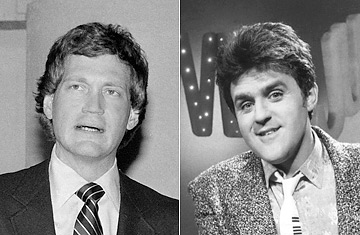
Comedians David Letterman and Jay Leno
(3 of 5)
Budd Friedman, who was just as much of a tightwad as Mitzi Shore and had struggled for years to keep his club afloat in New York, didn't pay his comedians either — in New York or L.A. — but he smartly positioned himself as a friend to the strikers. His L.A. club had been severely damaged in a fire just before the strike began, but he set up a makeshift performance space in the bar area of the club and continued to operate, promising to abide by whatever agreement the comics reached with Mitzi. Meanwhile, with most of her talent on strike, Shore shut down the Comedy Store for a couple of weeks, then reopened it, using the few loyalists who crossed the picket line, like Hamilton and Maynard, as well as several neophytes who saw the strike as an opportunity to get stage time. But she was shocked and hurt that so many of the comics she had nurtured, and in some cases helped out financially, were now turning against her. "The people who stabbed her in the back were people she fed and gave places to live," says Alan Bursky, the former stand-up who had become an agent — and who ostentatiously crossed the picket line just to show his support for Mitzi.
She was crushed the night Letterman — one of her favorites, the kid from Indiana whom she took under her wing and, she claimed, had talked into staying when he wanted to go back home — showed up on the picket line. "I watched him in the bay window here," Mitzi would recall years later. "I was taken aback. I was crying. Three and a half years working with him, every night. I called him that night at his apartment. I was totally choked up. And he said, 'Those comedians are my friends. And they'll be my friends for the rest of my life.' I said, 'I'm sorry to hear that, David.'" Says Argus Hamilton: "It broke her heart."
Hamilton began negotiating as her representative and presented her with a proposal to pay the comedians twenty-five dollars per set in the Original Room. She rejected it flat out. "She was so hurt over David Letterman that she continued to dig her heels in," he says. "She just absolutely refused. It cost her her greatest strength: her cool rationality." As the strike dragged on, Mitzi tried to lure the comics back with a promise to pay them twenty-five dollars per set on weekends only. Garry Shandling, one of the club's top acts at the time, thought it was a reasonable offer and went back to work.
Shandling's decision to cross the picket line came as a blow to the strikers. The other comics who had kept working were mostly close friends of Mitzi's or young kids who didn't know any better. Shandling was different. "This wasn't a hick off the street," says Letterman. "You could tell that Garry was a real talent." Dreesen calls his move "unconscionable." Shandling says he felt the strike had simply dragged on too long, and claims he got private support for his position from other striking comics, who felt the same way but were afraid to cross the picket line. "I called up Dave Letterman — I didn't know him — and I said, what do you think? And he said, 'I think the whole thing is silly; I'm not involved in it one way or the other.' My sense of it was he wasn't taking any position." (Letterman doesn't recall the conversation, but says he was fully supportive of the strike. "I don't remember giving my blessing to cross the line," he says. "If I actually thought that way, I would have gone back.") "I think there was a lot of good that was accomplished by that strike," says Shandling. "I certainly didn't cross the picket line just to work. But I thought it could have been resolved. It did not need to be dragged out."
Tensions between the strikers and nonstrikers grew. Dreesen and John Witherspoon — a stand-up who also worked as a doorman and sometime manager of the club — acted as marshals on the picket line, protecting the strikers from harassment by Mitzi loyalists. One night, the bad blood got out of hand, as one of the antistrike comics tried to drive a car through the picket line, brushing some of the comics and knocking Jay Leno to the pavement with a loud thud. Dreesen ran over to him, panicked that Leno had been seriously injured. Leno gave him a wink; he was only feigning an injury and had thumped the car with his hand. But he got hauled off to the hospital in an ambulance anyway, and the incident seemed to sober up both sides.
